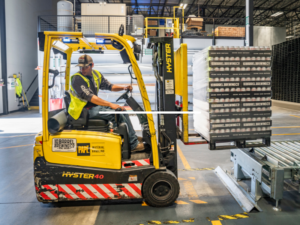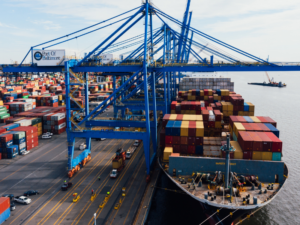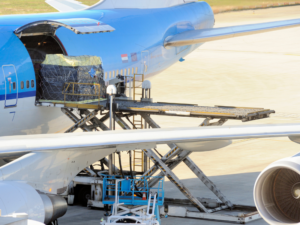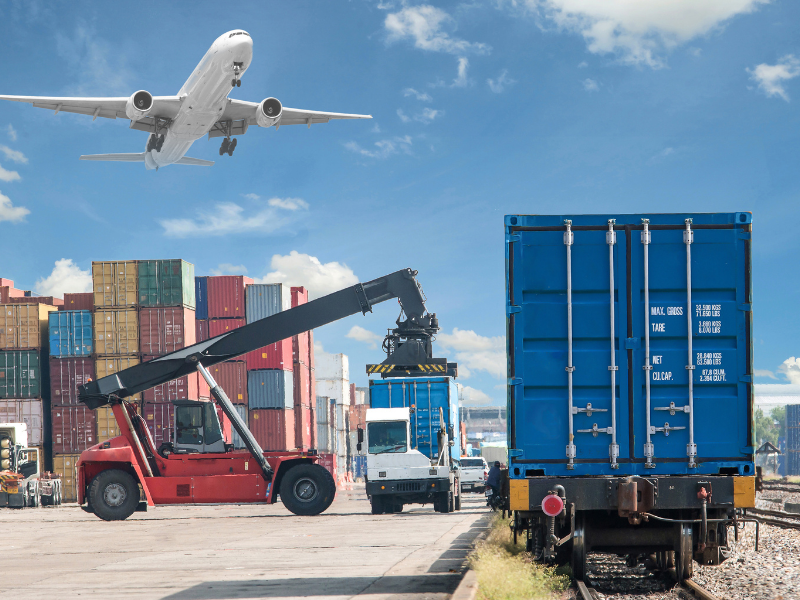Wondering “What is freight?”, or “What’s the difference between freight and general delivery?” You’re not alone. Freight forms a significant portion of Australia’s economy, and yet, many Australians are not entirely sure on what goes on behind the scenes of their deliveries. Within this article, we’re going to break down the freight service definition, provide an in-depth insight into the different types of freight, and what’s involved if you require the services of a freight company.
So, What Is Freight?
Put simply, freight is the transportation of goods in bulk across the world, by land, sea, or sky, and is different from small parcel shipping due to size and quantity.
Freight companies use various means of transport to deliver goods efficiently and securely, from cargo ships to air crafts, trucks, and freight trains.
What Classifies as a Freight Shipment?
There are few goods too ambitious for freight shipping in Australia. Generally speaking, whatever you need transported, it can be classified as a freight shipment. So, let’s break down what is ‘freight’, specifically. For Freight Match, our freight means moving items that include:
- General Freight
- Small items
- Interstate Freight
- Express Parcel Delivery
- Pallet Freight
- Heavy machinery freight
- Building materials freight
- Container freight
Please note that this list is extensive but not inclusive. If you have an item not mentioned on this list, Freight Match Australia can help you out.

What Is Land Freight?
Land freight refers to shipments made overland by trucks, vehicles, or rail. The forwarder must get from point A to point B, whether local or interstate, via a land-based network.
Road Freight
Road freight, or land haulage, refers to transporting cargo by road through the use of motor vehicles. Shipping freight by road is much cheaper in comparison to the ocean and air shipment vessels. Road freight services also generally have access to more rural locations not accessible by air, sea, or rail.
There are two types of road freight:
Less Than Truckload (LTL) is ideal for smaller cargo shipments that do not fill the truck to capacity. Sharing cargo space reduces costs, which means longer delivery times as multiple delivery stops are required.
Full Truck Load (FTL) is best suited to larger or more expensive cargo shipments that fill the entire truck. FTL is more expensive but offers shorter delivery time frames.
LTL and FTL provide different solutions. Before making your decision, consider your shipment size, budget, any time constraints, and the nature of your shipment.
Rail Freight
Moving freight via rail is ideal for heavier goods and materials that require transportation in large quantities. The rail network accommodates non-time-sensitive commodities with high priority exportation, such as iron ore and coal. They are typically cost-efficient, secure, predictable, and consistent.
There are three types of rail freight services.
Intermodal freight services connect ports and regional networks to other locations, hubs, and capital cities. It integrates the benefits of various modes of transport to reduce costs and increase efficiency. In other words, Intermodal freight is carried out partially on rail and then other vehicles for the remainder of the trip.
Import Export rail freight services offer a controlled form of transport, in and out of a port in one trip. They can accommodate a range of goods, from agricultural products to timber and mineral resources.
Bulk Freight trains carry heavier, bulkier items; Anything from airplane parts and industrial products to paper and grain.
There a numerous freight trains to accommodate different purposes, including:
- Boxcar
- Tanker Car
- Centerbeam Car
- Hopper Car
- Flat Car
- Intermodal Well Car

What Is Sea Freight?
Sea freight is a method of shipping that employs cargo ships to carry goods over the sea. Generally, (depending on the size of the ship) around 18,000 shipping containers can be loaded onto the back of a vessel and sailed to their destination. Transportation via sea freight reduces the cost of international and domestic import and export trading. The types of sea freight include:
Full Container Load (FCL). FCL is where you purchase the entire container to transport your goods. That is a safer option, as you can guarantee that your goods will remain undisturbed throughout the journey. FCL is the best, most cost-effective option when you are looking to ship a higher quantity of goods, enough to fill the majority of the container.
Less Than Container Load (LCL). LCL is a preferred option if you do not require an entire shipping container to fit your cargo. It allows a freight forwarder to consolidate various freight together and reorganise them at the destination.
Roll On Roll Off (RORO). RORO refers to freight boarded onto large ocean vessels by vehicles. They sail to their destination and are rolled off at the port, eliminating the need for shipping containers.
Dry Bulk Shipping. Significant bulk materials such as iron ore, coal, salt, sugar, sand, cement, grains, and metal materials are stored in the hold compartment of the ship rather than containers for shipping.

What Is Air Freight?
Airfreight is the transportation of shipments via a commercial or charter air carrier. Airfreight shipping is advantageous for time-critical jobs and offers a high level of security.
Goods that are transported by air are tightly managed by airport security. Commodities suitable for land or sea transportation are not always allowed on aircraft.
Items that cannot ship via air freight include:
- Valuable items (such as jewellery)
- Perishables and food products
- Living Animals
- Human or animal remains
- Illegal Goods
- Fire extinguishers
- Dry ice
- Fine art of any description
- Money
- Precious metals (silver, gold, platinum, iridium, osmium, rhodium, ruthenium)
- Precious stones (diamonds, sapphires, rubies, emeralds)
- Semi-precious stones (crystals such as amethyst, rose quartz, topaz, opals)
Freight carriers will not accept any hazardous or illegal materials that could endanger the handling staff. Failure to adhere to freight restrictions could result in prosecution and relevant penalties.
Dangerous goods include:
- Corrosives (acids, alkalis, mercury)
- Petrol, or petrol-powered machinery
- Fireworks, signal flares, sparklers, or explosives
- Infectious substances
- Ammunition, gunpowder, gas, or pepper sprays
- Radioactive materials

The Benefits of Freight Shipping
Freight Shipping is a cost-effective means of transporting bulk goods. It is safe and secure and eases the stress of shipping.
Freight transportation offers efficient, safe, and cost-effective transportation of your goods. Freight forwarders are rehearsed in managing the admin and logistics that ensure timely delivery.
Transporting freight by land, air, or sea, necessitates operators to be experts in negotiating tariffs and customs regulations to manage the potential risks of shipping.
Factors That Determine Freight Shipping Rates
Freight costs are determined by several factors, namely size (height, length, weight), density, value, stow-ability, handling, and liability. The urgency of the delivery is also a key determinant of how much freight will cost, from one destination to another.
How Long Do Freight Shipments Take?
The time frame of freight delivery is dependent on the nature of the service. Some providers can guarantee same-day delivery of smaller goods, while other larger goods and equipment will generally take longer. It also depends on the intended destination of your freight, and your mode of shipping.

Ship Your Freight with Freight Match Today!
Now we’ve answered all your questions regarding “what is freight?”, you should have a relatively good idea of what’s involved in getting your delivery from A to B.
At Freight Match, we are the leading agents of freight, Australia-wide. We offer access to a network of thousands of first-class, approved providers and freight operators across Australia.
We offer a wide range of transport options at competitive prices and handle all our freight with the highest quality of care. No matter how small or ambitious the job, we’ve got you covered. We’ll get deliver your items from A to B and ensure they land in the right hands.
If you have a freight inquiry, talk to an expert on 1300 419 825, or request a quote on our through our contact form, and get your goods shipped today!
